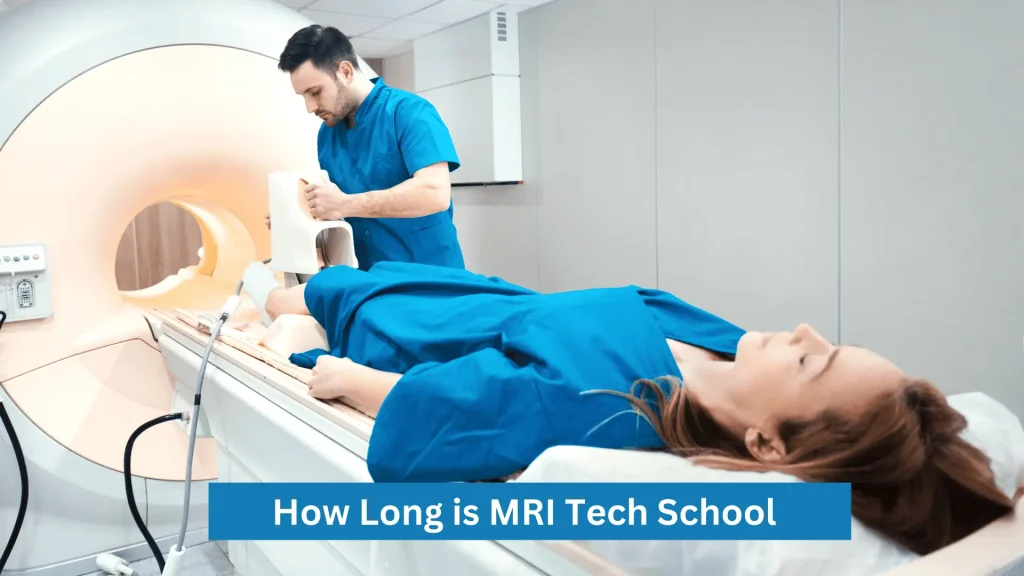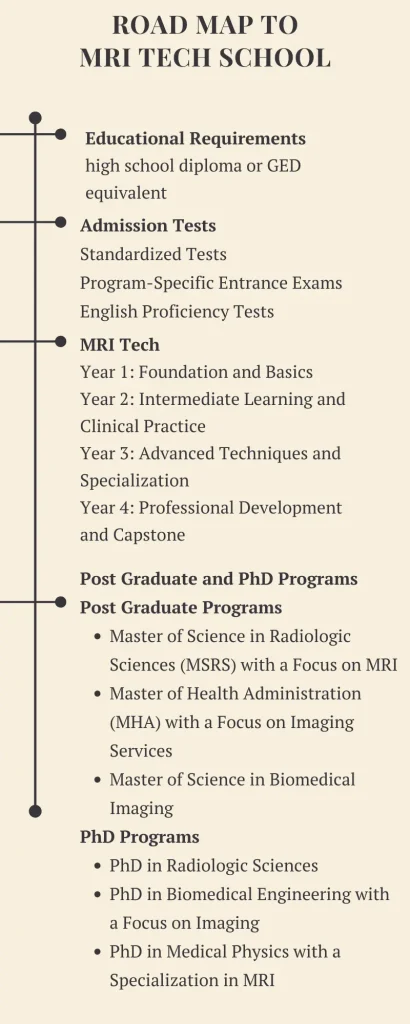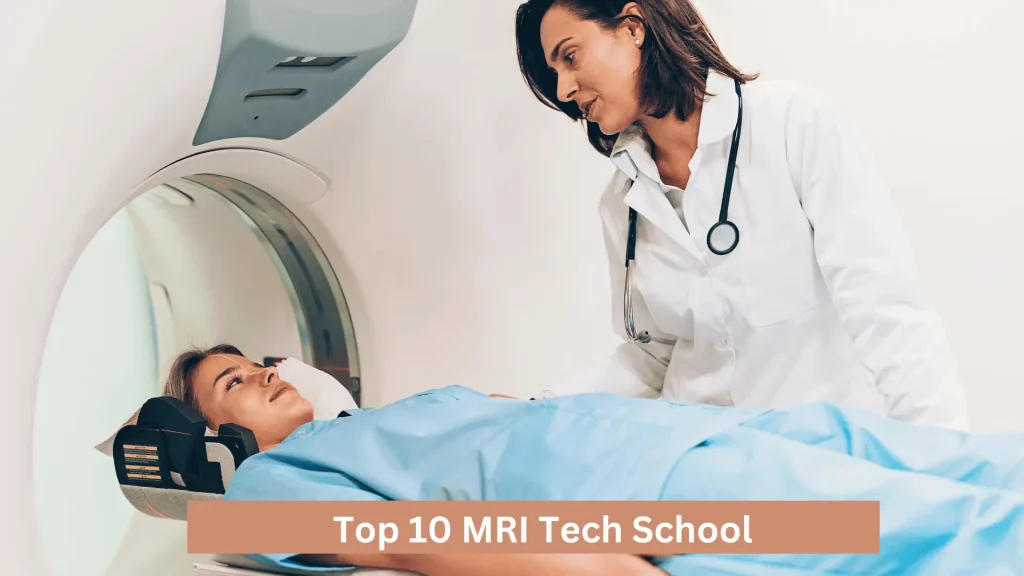Discover How Long is MRI TECH School Takes. Training to become an MRI technician typically spans 1 to 2 years, depending on the program type. Certificate programs can take about a year, while earning an associate degree may extend it to 2 years. Learn more about How Long MRI Tech School is to plan your career path effectively.
What is MRI Tech School
MRI Tech School prepares students to operate MRI machines, focusing on anatomy, patient care, and imaging techniques. This specialized training equips students with skills to perform diagnostic scans and ensure patient comfort and safety during procedures.

MRI Tech programs typically blend classroom learning with hands-on clinical practice, emphasizing technical proficiency and medical ethics. Graduates pursue careers in hospitals, imaging centers, and clinics, playing a crucial role in healthcare by producing detailed images used for diagnosing various medical conditions.
How Long is MRI TECH School
Year 1: Foundation and Basics
Semester 1:
- Introduction to MRI Technology: Overview of MRI technology, its history, and its importance in medical imaging.
- Medical Terminology: Basic medical terms and definitions essential for understanding clinical practices.
- Anatomy and Physiology I: Introduction to human anatomy and physiology, focusing on the skeletal, muscular, and nervous systems.
- Physics for MRI Technologists: Basic physics principles related to magnetic resonance imaging.
Semester 2:
- Anatomy and Physiology II: Continuation of anatomy and physiology, covering cardiovascular, respiratory, and digestive systems.
- Patient Care and Safety: Essentials of patient care, safety protocols, and ethical considerations in medical imaging.
- MRI Instrumentation: Introduction to MRI machines, components, and their functions.
- Basic Pathophysiology: Understanding disease mechanisms and their manifestations in the human body.
Year 2: Intermediate Learning and Clinical Practice
Semester 3:
- MRI Procedures I: Basics of performing MRI procedures, patient positioning, and protocol selection.
- Radiographic Imaging: Overview of other imaging modalities, such as X-ray and CT, and their comparative roles.
- Cross-sectional Anatomy: Detailed study of anatomical structures in different planes used in MRI.
- Clinical Practicum I: Hands-on training in a clinical setting under supervision.
Semester 4:
- MRI Procedures II: Advanced MRI procedures, including specialized imaging techniques.
- Contrast Media in MRI: Use of contrast agents, their mechanisms, and safety considerations.
- Pathology for MRI Technologists: Identifying and understanding common pathologies seen in MRI scans.
- Clinical Practicum II: Continued hands-on experience with increased responsibility and complexity.
Year 3: Advanced Techniques and Specialization
Semester 5:
- Advanced MRI Techniques: Exploration of advanced techniques such as functional MRI (fMRI), diffusion tensor imaging (DTI), and spectroscopy.
- MRI in Neurology: Specialized imaging techniques for neurological conditions.
- MRI in Musculoskeletal Imaging: Techniques and protocols for imaging musculoskeletal disorders.
- Clinical Practicum III: Advanced clinical training with focus on specialization areas.
Semester 6:
- MRI in Cardiology: Imaging techniques for cardiac conditions and diseases.
- Quality Control in MRI: Ensuring image quality and safety standards in MRI practice.
- Research Methods in MRI: Basics of research methodology, study design, and data analysis in MRI-related research.
- Clinical Practicum IV: Final clinical training, focusing on independent practice and advanced imaging techniques.
Year 4: Professional Development and Capstone
Semester 7:
- MRI in Oncology: Imaging techniques for cancer diagnosis and monitoring.
- Health Care Management: Basics of healthcare management, including leadership, administration, and legal aspects.
- Capstone Project I: Beginning of a major research or practical project integrating knowledge and skills acquired.
- Clinical Practicum V: Continued clinical practice with emphasis on leadership and teaching roles.
Semester 8:
- MRI in Pediatrics: Specialized imaging techniques for pediatric patients.
- Ethics and Professionalism: In-depth study of ethical issues and professional conduct in MRI technology.
- Capstone Project II: Completion and presentation of the capstone project.
- Clinical Practicum VI: Final clinical rotation focusing on readiness for professional practice.

HOW TO ENTER MRI TECH SCHOOL
Educational Requirements
High School Diploma or Equivalent:
Completion of high school or GED is mandatory.
Coursework in science (biology, chemistry, physics) and mathematics (algebra, geometry) is recommended.
Prerequisite Courses:
College-level courses in anatomy, physiology, and medical terminology.
Some programs may require coursework in physics or chemistry.
GPA Requirements:
A minimum GPA, often around 2.5 to 3.0, on a 4.0 scale.
Entry Tests
Standardized Tests:
Some programs may require SAT or ACT scores.
Minimum score requirements vary by program.
Program-Specific Entrance Exams:
Some MRI Tech programs might have their own entrance exams to assess applicants’ knowledge in relevant subjects.
English Proficiency Tests:
For non-native English speakers, tests like TOEFL or IELTS may be required.
Application Process
- Research and Choose Programs:
Identify MRI Tech schools that fit your career goals, location preferences, and academic background.
- Complete Application Forms:
Fill out application forms for each program you are interested in.
Many schools use online application portals.
- Submit Transcripts:
Provide official high school and any college transcripts.
- Letters of Recommendation:
Typically 2-3 letters from teachers, employers, or professionals who can attest to your qualifications and character.
- Personal Statement or Essay:
Write an essay outlining your interest in MRI technology, career goals, and why you chose the specific program.
- Resume:
Include a resume detailing your educational background, work experience, volunteer work, and any relevant skills or certifications.
- Interview:
Some programs may require an interview as part of the selection process.
Financial Aid
Federal Financial Aid:
FAFSA: Complete the Free Application for Federal Student Aid (FAFSA) to determine eligibility for federal grants, loans, and work-study programs.
Pell Grants: Need-based grants that do not need to be repaid.
Federal Student Loans: Low-interest loans that need to be repaid after graduation.
State Financial Aid:
State-specific grants, scholarships, and loan programs.
Institutional Financial Aid:
Scholarships and grants offered by the MRI Tech school itself.
Work-study opportunities on campus.
Private Scholarships:
Scholarships offered by private organizations, foundations, and companies.
Check with professional organizations related to radiologic technology.
Private Loans:
Loans from private lenders, banks, or credit unions. These often have higher interest rates than federal loans.
Employer Tuition Assistance:
Some employers offer tuition reimbursement or assistance programs for employees pursuing education in relevant fields.
Military and Veterans Benefits:
Educational benefits for active-duty military, veterans, and their families, such as the GI Bill.
Post Graduate and PhD Programs
Postgraduate Programs for MRI Tech
1. Master of Science in Radiologic Sciences (MSRS) with a Focus on MRI:
- Program Overview: Advanced study of MRI technology, focusing on clinical skills, leadership, and research.
- Core Courses:
- Advanced MRI Procedures
- MRI Physics and Instrumentation
- Cross-sectional Anatomy and Pathology
- Research Methods and Biostatistics
- Specialization Tracks:
- Pediatric MRI
- Cardiovascular MRI
- Neuroimaging
2. Master of Health Administration (MHA) with a Focus on Imaging Services:
- Program Overview: Prepares technologists for leadership roles in healthcare management, focusing on imaging departments.
- Core Courses:
- Healthcare Policy and Economics
- Healthcare Management and Leadership
- Quality Management in Imaging Services
- Health Informatics
- Elective Courses:
- Strategic Planning in Healthcare
- Financial Management in Healthcare
- Legal and Ethical Issues in Healthcare
3. Master of Science in Biomedical Imaging:
- Program Overview: In-depth study of various imaging modalities, with a strong emphasis on MRI.
- Core Courses:
- Advanced MRI Techniques
- Biomedical Signal Processing
- Image Reconstruction and Analysis
- Functional and Molecular Imaging
PhD Programs for MRI Tech
1. PhD in Radiologic Sciences:
- Program Overview: Focuses on advanced research and development in radiologic sciences, including MRI technology.
- Core Courses:
- Advanced MRI Physics
- Quantitative Imaging Techniques
- Radiologic Sciences Research Methodologies
- Statistical Analysis in Medical Research
2. PhD in Biomedical Engineering with a Focus on Imaging:
- Program Overview: Interdisciplinary program combining engineering principles with medical imaging technologies.
- Core Courses:
- Medical Image Analysis
- MRI System Design and Optimization
- Computational Methods in Biomedical Imaging
- Neuroimaging and Brain Mapping
3. PhD in Medical Physics with a Specialization in MRI:
- Program Overview: Combines physics, medicine, and engineering to advance MRI technology and its clinical applications.
- Core Courses:
- Advanced Medical Physics
- MRI Physics and Applications
- Radiation Biology and Safety
- Computational Physics in Medical Imaging
Top 10 MRI TECH Schools

1. University of North Carolina at Chapel Hill
Program: Bachelor of Science in Radiologic Science with a focus on MRI.
Highlights: Strong research opportunities, excellent clinical partnerships, and a comprehensive curriculum.
2. University of Iowa
Program: Bachelor of Science in Radiologic Science with specialization in MRI.
Highlights: State-of-the-art imaging facilities, emphasis on research, and excellent clinical rotations.
3. University of Texas Health Science Center at San Antonio
Program: Bachelor of Science in Radiologic Sciences with a focus on MRI.
Highlights: Renowned faculty, strong clinical training, and advanced research facilities.
4. University of Washington
Program: Bachelor of Science in Radiologic Technology with an MRI track.
Highlights: Strong emphasis on interdisciplinary education, cutting-edge research, and extensive clinical training.
5. Duke University
Program: Bachelor of Science in Medical Imaging with a specialization in MRI.
Highlights: High faculty-to-student ratio, strong clinical partnerships, and a focus on research innovation.
6. University of Wisconsin-Madison
Program: Bachelor of Science in Radiologic Sciences with an MRI concentration.
Highlights: Comprehensive curriculum, access to advanced imaging technology, and strong ties to medical research.
7. University of Pittsburgh
Program: Bachelor of Science in Radiologic Technology with MRI specialization.
Highlights: Innovative research opportunities, excellent clinical affiliations, and a robust curriculum.
8. Emory University
Program: Bachelor of Science in Radiologic Sciences with a focus on MRI.
Highlights: Strong clinical training, emphasis on research, and a well-established program in medical imaging.
9. Boston University
Program: Bachelor of Science in Medical Imaging with an MRI track.
Highlights: Extensive clinical network, strong research programs, and a focus on advanced imaging techniques.
10. University of Southern California (USC)
Program: Bachelor of Science in Radiologic Sciences with MRI specialization.
Highlights: World-renowned faculty, state-of-the-art imaging facilities, and strong industry connections.
Factors Affecting the Length of MRI TECH School
1. Type of Program
Certificate Programs
- Length: Typically 1 year
- Details: Designed for those who already have a background in radiologic technology or a related field. These programs focus specifically on MRI technology and procedures.
Associate Degree Programs
- Length: 2 years
- Details: Suitable for individuals entering the field of medical imaging. Includes general education courses in addition to MRI-specific training.
Bachelor’s Degree Programs
- Length: 4 years
- Details: Comprehensive programs that provide a broad education in radiologic sciences, including MRI technology, along with general education requirements.
Post-Baccalaureate Certificate Programs
- Length: 1-2 years
- Details: Intended for individuals who already have a bachelor’s degree in a related field. These programs focus on advanced MRI training.
2. Educational Background and Prior Experience
Healthcare Experience
- Impact: Individuals with prior experience in healthcare, such as radiologic technologists or nurses, may qualify for accelerated programs or advanced standing, reducing the overall length of the program.
Transfer Credits
- Impact: Students with relevant coursework from previous education may transfer credits, shortening the duration of the program.
3. Program Structure and Scheduling
Full-Time vs. Part-Time Enrollment
- Impact: Full-time students typically complete programs faster than part-time students. Part-time enrollment allows students to balance work and study but extends the duration.
Accelerated Programs
- Impact: Some schools offer accelerated programs that condense coursework into a shorter period, requiring a more intense study schedule.
Final Verdict
The length of MRI Tech school varies from 1 to 4 years, influenced by program type, prior education, clinical requirements, and enrollment status. Certificate programs are shortest, while bachelor’s degrees take longest. Clinical hours, state requirements, and specialization can also extend duration. Plan accordingly to meet career goals.
FAQs
How long does it take to complete MRI Tech school?
The duration ranges from 1 year for certificate programs to 4 years for a bachelor’s degree, depending on the type of program and prior education.
What are the prerequisites for enrolling in an MRI Tech program?
Typically, a high school diploma or equivalent is required. Some programs may require prerequisite courses in anatomy, physiology, and medical terminology, or prior experience in radiologic technology.
What certification is needed to work as an MRI technologist?
Certification from the American Registry of Radiologic Technologists (ARRT) is commonly required. Some states may also have additional licensing requirements.
What kind of clinical training is included in MRI Tech programs?
Programs include hands-on clinical training in hospitals or imaging centers, where students learn to operate MRI equipment, conduct scans, and ensure patient safety.
Are there financial aid options available for MRI Tech programs?
Yes, financial aid options include federal and state grants, loans, scholarships, and work-study programs. Many schools also offer institutional scholarships and assistantships.
